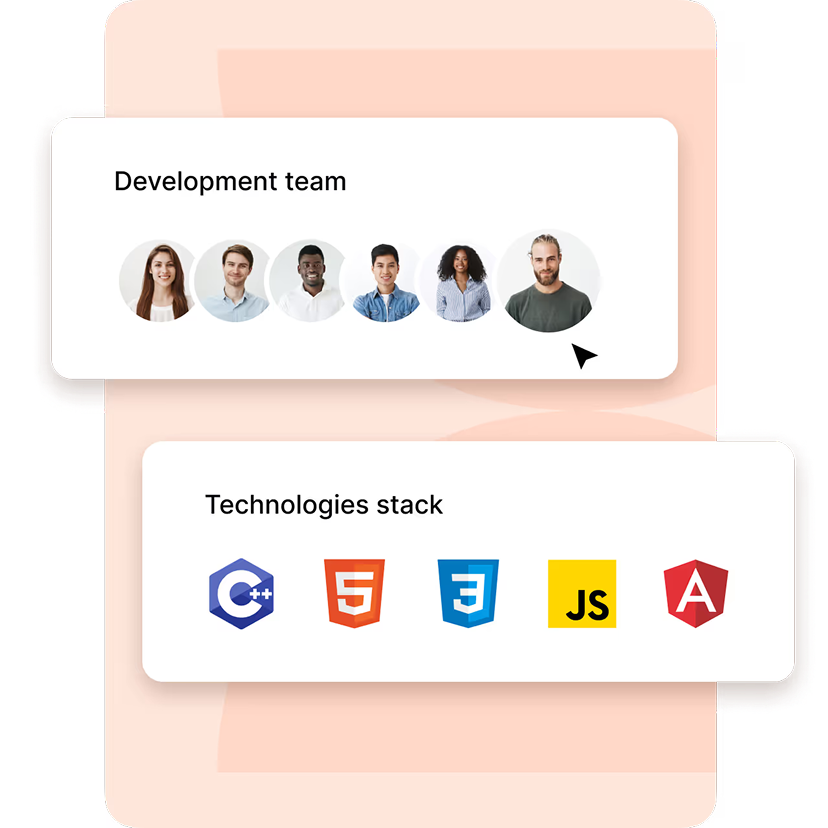Hire Node.js Developers
Get a personalized demo now.webp)









Node.js allows developers to use JavaScript on both the client and server sides. It is well-suited for real-time applications such as chat applications, online gaming, and collaborative tools due to its event-driven, non-blocking architecture. It can also be used in IoT development for controlling and managing devices and sensors.
With Node.js, developers can use a single language (JavaScript) both on the client and server side. This can lead to increased developer productivity and code reuse. Ryan Dahl created Node.js in 2009. He wanted to build scalable network applications and realized that traditional server-side technologies were not well-suited for handling a large number of concurrent connections. It gained popularity quickly due to its performance and has since become a fundamental technology in web development.
A Node.js developer is an expert in building server-side applications using JavaScript, harnessing the power of Node.js to create scalable and efficient solutions. These professionals play a pivotal role in developing APIs, managing databases, and ensuring seamless real-time data flow—making them indispensable for modern web and IoT projects. Their toolkit includes strong JavaScript skills, a deep understanding of asynchronous programming, and hands-on experience with RESTful APIs.
Node.js developers are the driving force behind robust, real-time digital solutions that deliver measurable business impact.
- Build scalable server-side applications to handle high-traffic and mission-critical business operations.
- Design and implement RESTful APIs that enable smooth integration with front-end interfaces and third-party services.
- Develop real-time features like chat, notifications, or live updates to boost user engagement and satisfaction.
- Integrate and manage both SQL and NoSQL databases for reliable, efficient data storage and retrieval.
- Optimize application performance and resolve issues to maintain speed and reliability under demanding conditions.
- Automate workflows and business processes with Node.js scripts, enhancing operational efficiency across teams.

Node.js developers are needed to build scalable and real-time applications. E-commerce websites like eBay leverages Node.js to provide seamless and fast user experiences, ensuring smooth shopping and bidding processes. In addition to web applications, Node.js developers are crucial in the Internet of Things (IoT) industry. They tackle challenges related to real-time communication, building responsive applications that deliver data updates instantaneously.
Many leading tech companies, including Netflix, PayPal, Uber, and LinkedIn, hire Node.js developers. They are essential problem solvers in a multitude of industries, tackling a diverse array of challenges.
JavaScript
Empowers developers to write efficient, maintainable code for both server-side and client-side logic.
Node.js
Serves as the runtime environment for building fast, scalable network applications using JavaScript.
SQL and NoSQL
Enables effective data management by connecting to and operating with a variety of database systems.
RESTful APIs
Facilitates seamless communication and data exchange between different software systems and services.
Node Package Manager
Streamlines development by managing project dependencies and leveraging reusable modules.
NPM packages
Expands application capabilities by integrating pre-built, community-driven solutions.
Job titles
Full-Stack Developer
Backend Developer
Web Developer
JavaScript Developer
API Developer
Software Engineer
IoT Developer
With thousands of professionals and technical experts, it’ll be easier to look for a Node Js Developer that fits in your team.
While searching on Google, use Boolean operators like "AND," "OR," and "NOT" to refine your search. For example, "Node.js Developer" AND "JavaScript" will show results for Node.js developers with proficiency in JavaScript.
You can also use the "inurl:" operator to find URLs with specific keywords. For example, "inurl:resume Node.js developer". Incorporate "filetype:" operator to search for particular file types, such as "filetype:pdf Node.js Developer resume" to find resumes in PDF format.
Some of the most popular LinkedIn communities where you can find devs are "Node.js Developers", "NODE.JS Developer Network", "Angular, React, VueJS, Node.JS Developers", etc. Explore the LinkedIn company pages of tech companies or startups that specialize in Node Js development. These pages often feature employees' profiles, which can be a source of potential candidates. And thus help you find Node JS developer with exceptional skills.
Online job boards
Post job openings on Indeed, LinkedIn, Naukri, Glassdoor, and Stack Overflow Jobs. Craft a clear and detailed job description that outlines the specific skills, experience, and qualifications you're looking for in a Node Js developer. To attract top Node Js talent, make sure your compensation package and benefits are competitive within the job market. Therefore, you can effectively leverage job posting platforms to find and hire Node Js developer with the right skillset.
Developer communities and forums
When looking to hire a Node Js developer, explore platforms like GitHub and Stack Overflow. Evaluate potential candidates by examining their projects. Consider the quality of their code, how much they contribute, and their overall activity. Seek out individuals with React JS developer skills that align with your project's needs. If your company has GitHub projects, showcase them to attract developers interested in your work.
Tech conferences and meetups
Attend Node Js and related events to network with talented developers. By attending talks and discussions, you can gain insights into the interests and expertise of developers, helping you find candidates with exceptional Node Js developer skills. Search for the upcoming regional or global React Js conferences online. Platforms like Eventbrite, Meetup, and Eventful allow you to search for and filter events. These events can be beneficial to hire Node JS developer for your organization.
HackerEarth hiring challenges
Sponsor online coding challenges to find competitive developers. For instance, Kore.ai collaborated with HackerEarth to run the NodeJS Developer Hiring Challenge in 2022, to hire Node.js Developers. These events can assist you in finding candidates with good Node JS developer skills.
Open source communities
Engaging with active contributors in Node JS-related open-source projects is a strategic approach to identify talented Node JS developers. By participating in discussions, reporting issues, or even collaborating on these projects, you can discover individuals with a strong commitment to the Node JS community. These contributors often maintain public repositories and share their Node JS portfolios, showcasing their skills and expertise.
Online learning platforms
Connect with Node JS enthusiasts on online learning platforms like Udemy and Coursera. Exploring the projects and assignments submitted by learners in these online courses can provide a glimpse into their practical skills and coding abilities. Node Js enthusiasts often use these platforms to showcase their proficiency. You can also find links to their personal portfolios or GitHub repositories. Thus, it will be easier for you to discover talented individuals who are actively enhancing their Node Js developer skills.
Local universities and coding boot camps
Collaborate with local academies and educational institutions to find aspiring Node JS developers. For instance, you can partner with coding bootcamps that offer Node.js courses. By engaging with instructors and students in these programs, you can identify promising talents who are eager to apply their newly acquired Node Js skills to real-world projects.
Social media channels
Use platforms like Twitter, LinkedIn, and Facebook to share projects and job openings. Engage with Node.js communities such as OpenJS Foundation community. Actively participating in discussions and direct outreach to individuals can help you hire developers with the right skillset. Crafting engaging posts about your company's Node.js initiatives and job opportunities can generate organic interest.
Referrals and employee networks
Promote employee referrals and leverage existing networks to gather recommendations in order to hire Node Js developer with the right skillset.
Hire top tech talent withour recruitment platform
Access Free Demo👍 Pro tip
Reddit is a great place to look for various Node.js-related communities, including r/nodejs, r/node, r/javascript, and r/npm etc. You can also join related Communities on Discord with thousands of members.
To hire a Node JS Developer, the most common assessment framework on HackerEarth includes
A combination of technical evaluations, coding exercises, and behavioral assessments. Here are some common components of the assessment framework:
Code completion tasks
Code completion tasks serve as invaluable tools in the hiring process for Node JS developers. These tasks provide a hands-on assessment of their coding proficiency. Integrating specific challenges during the Node JS developer hiring assessment, you can evaluate a candidates' problem-solving skills and understanding of frameworks. You can include questions related to asynchronous programming, event-driven architecture, and other crucial Node JS concepts. Therefore, incorporating such questions in the hiring a will assessment will help you find Node JS developer with the right skillset.
Multiple-choice questions (MCQs)
MCQs can provide a structured approach to assess a candidate's problem-solving abilities. These questions can include specific modules, event-driven architecture, and asynchronous programming. Integrating MCQs into the Node JS developer hiring assessment ensures a streamlined evaluation, aiding in the identification of candidates with the right skill set. Ultimately enhancing the efficiency and effectiveness of the recruitment process.
Project-specific questions
Project-specific questions are integral in hiring Node JS developers. They provide a targeted assessment of candidates' practical Node JS developer skills. By tailoring questions to the specifics of the project, you can gauge candidates' familiarity with the technologies and frameworks relevant to the job at hand. These questions can include their ability to handle asynchronous operations, optimize performance, and ensure scalability. Through project-specific questions, you can find Node JS developer who not only possesses theoretical expertise but also has a practical understanding of how to navigate challenges specific to the role.
Language-specific questions
Language-specific questions are instrumental in the hiring process for Node JS developers. These questions allow recruiters to assess candidates' depth of understanding and proficiency in Node JS. These questions might include event-driven architecture, asynchronous programming, and the npm ecosystem. It can help you accurately identify and hire Node JS developer with the requisite Node JS expertise.
Our bias-free, objective platform has facilitated 1,00,000+ assessments per month
Get a personalized demo nowCode completion task
- Write a JavaScript function that reverses a string.
- Write a Node.js function that reads a file asynchronously using the 'fs' module and returns its contents.
- Build a RESTful API in Node.js and Express.js that can perform CRUD operations on a simple resource (e.g., a list of items).
- Implement error handling for a Node.js function that reads a non-existent file and returns an appropriate error message.
- Create a simple unit test using a testing framework like Mocha or Jest for a function that adds two numbers.
Multiple-Choice Questions (MCQs)
- In Node.js, which module is used for file operations like reading and writing files?
- fs
- http
- path
- events
- Which HTTP method is typically used for updating a resource on the server in a RESTful API?
- GET
- POST
- PUT
- DELETE
- Which Node.js module is commonly used for unit testing and assertion?
- assert
- test
- mocha
- npm
Questions related to JavaScript
- How do you declare a variable in JavaScript? What are the different variable declaration keywords?
- Describe the difference between "==" and "===" in JavaScript for equality comparison.
- How do you create and manipulate objects in JavaScript?
- What is the purpose of the "this" keyword in JavaScript? How does its value change in different contexts?
- What is the Document Object Model (DOM) in JavaScript, and why is it important for web development?
NPM (Node Package Manager) questions
- How do you install a specific version of a package using npm? Provide an example.
- Explain the difference between local and global packages in npm.
- How can you install development dependencies (devDependencies) using npm, and why might you need them?
- How do you uninstall a package and remove it from the "package.json" file using npm?
- Explain the use of "npm cache" and how it helps with package caching and performance.
👍 Pro tip
These sample questions provided here are for interviewing early-experience talents. For more customized assessments for candidates with higher experience, you can contact our team at contact@hackerearth.com or request a demo here.
Job title
A Node JS developer job description should begin with a clear and concise job title that reflects the role, such as "Web Developer", "Backend Developer", and “JavaScript Developer”. Having a clear role can help you filter out candidates beforehand. And hence help you hire Node JS developer whose tech stack aligns with your requirements.
Job summary
Provide a brief overview of the position, clarifying the key responsibilities and objectives. Describe what the user's primary focus is and how it contributes to the company's goals. Including a summary in the Node JS developer job description can provide candidates with an overview of the role they are applying for.
Responsibilities
A Node JS developer job description should outline the specific tasks and responsibilities that they will be expected to handle. This may include:
- Creating robust, scalable, and efficient server-side applications using Node.js
- Designing and implementing RESTful APIs and handling HTTP requests and responses
- Building real-time applications like chat applications, online gaming, or collaborative tools using technologies such as WebSockets or Socket.io
- Connecting to databases (SQL and NoSQL) and performing data operations
- Developing custom middleware to handle tasks such as authentication, request logging, and error handling in web applications
- Writing unit tests, integration tests, and end-to-end tests to ensure code quality and reliability
It's an important part of the Node JS developer job description. These key points will help developers understand the job requirements. Including these key points beforehand can also help you filter out candidates. And thus help you hire Node JS developer with the right skillset.
Node JS Developer skills and qualifications
List the essential Node JS developer skills and qualifications that candidates must possess, including, but not restricted to:
- Proficiency in JavaScript, including ES6 and newer language features
- Experience with web development, including front-end technologies (HTML, CSS, and client-side JavaScript)
- Strong understanding of Node.js runtime, architecture, and core modules
- Ability to create server-side applications, RESTful APIs, and real-time applications using Node.js
- Knowledge of asynchronous programming and experience with Promises and async/await
- Expertise in package management using npm (Node Package Manager)
- Proven work experience as a Node.js developer or similar role
- Portfolio of projects demonstrating Node.js expertise
Mentioning the required Node JS developer skills can help candidates understand the role they are applying for. As a result you can find and hire Node JS developer with the right skillset.
Preferred skills
Mention any additional Node JS developer skills or qualifications that would be beneficial but not mandatory for the role. It might attract candidates with broader skillset and thus help you hire Node JS developer with exceptional skills. You can also ask for experience with specific tools, libraries, or domains.
Education and experience
Specify the educational background and professional experience required for the position. This could range from a bachelor's degree in computer science or a related field to several years of relevant experience. Mentioning these prerequisites can help you filter out the candidates beforehand. And thus help you hire Node JS developer with the qualifications you are looking for.
Company culture and EVPs
Briefly highlight your company's culture, values, and any unique perks or benefits offered to employees that can help attract candidates who align with your company's ethos.
Application instructions
Provide instructions on how candidates can apply for the position. Include where to send their resume, portfolio, or other required documents. Also, specify the deadline for applications, if applicable. It's another crucial point to be included in the Node JS developer job description.
Equal Opportunity Statement
Include a statement affirming that your company is an equal opportunity employer committed to diversity and inclusion.
Skill-first hiring requires that the developer interview process be designed to understand the candidate’s skill and experience in the given domain. You can consider the following guidelines when conducting a face-to-face interview with a Node JS Developer:
Conduct a real-time technical assessment
Usually candidates are given a remote assessment before the interview. However, using the interview platform to assess skills in real time will tell you a lot about the candidate’s communication skills and thought process.
FaceCode is HackerEarth’s flagship tech interview platform with a built-in question library you can use to test the candidate’s knowledge of Node JS concepts. The built-in IDE environment can be used for assessing their ability to write clean, efficient, and maintainable code. You can also use the pair-programming method to observe their problem-solving approach, logical thinking, and attention to detail.
Learn how Facecode can make tech interviews easier
Understand the candidate’s project experience and review the portfolio
During the Node JS developer interview assessment, explore the candidate's past and present projects. Focus on their personal contributions and the skills they used. Ask them to discuss a project, detailing their responsibilities, problem-solving, and collaboration. If available, review their portfolio or code samples for coding style, documentation, and project quality.
Understand if they are a good culture and team fit
Another crucial aspect to check during the Node JS developer interview assessment is if they align with your organization's values. While technical skills are essential for a developer, the significance of cultural fit should not be overlooked. The ideal candidate must possess not only accurate coding abilities but also effective communication and collaboration skills to thrive in agile and collaborative environments. Evaluating a candidate's capability to work both independently and collaboratively in a team is crucial. This assessment provides valuable insights into the candidate's problem-solving skills, communication, and adaptability, helping to determine their fit for the role and the team dynamics.
Additionally, this evaluation offers engineering managers a chance to exhibit their team culture and values, enabling them to find a candidate who aligns well with the team's ethos.
United States
Salaries are highest in major cities and for developers with advanced Node.js expertise or experience in large-scale, real-time projects.
- Average Annual Salary: $126,425–$141,315 per year
- Entry-Level: $105,000–$113,000 per year
- Mid-Level: $132,500–$146,204 per year
- Senior-Level: $154,513–$179,000+ per year
United Kingdom
London and other major cities offer higher salaries, particularly for senior roles or those with advanced Node.js and backend architecture skills.
- Median Annual Salary: £60,000–£66,000 per year
- Entry-Level: £42,500–£55,000 per year
- Mid-Level: £60,000–£77,500 per year
- Senior-Level: £77,500–£100,000+ per year
Australia
Salaries are highest in Sydney and Melbourne, with top pay for experienced and senior developers, especially in tech, finance, and enterprise sectors.
- Sydney Average Salary: A$116,772–A$140,000 per year
- Entry-Level: A$85,000–A$121,250 per year
- Mid-Level: A$123,750–A$140,000 per year
- Senior-Level: A$148,709–A$163,750+ per year
What qualifications should I look for in a Node.js Developer?
When seeking a qualified Node.js developer, look for candidates with a bachelor's degree in computer science or a related field. But always prioritize practical experiences over any type of degree or certifications. They should have a strong portfolio showcasing their expertise in JavaScript, Node.js, and web development. A proven track record of working on server-side applications and APIs should be a plus.
Additionally, certifications or relevant courses in Node.js and web technologies can be beneficial. Effective communication skills, a commitment to coding standards, and a proactive approach to continuous learning are also valuable traits.
Do we require the candidate to have experience in all the necessary tools or just one is enough?
A solid foundation in Node.js and relevant web development concepts is crucial, with proficiency in one or more key tools (such as a web framework, database, or testing framework) being sufficient for many roles. The specific toolset required can vary based on the job's demands.
Front-end developers might prioritize knowledge of client-side JavaScript frameworks, while back-end developers may focus on server-side frameworks like Express.js and database tools. DevOps engineers prioritize deployment and containerization tools, while full-stack developers should have a balanced skill set covering both front-end and back-end technologies. You should look for candidates who are highly adaptable and willing to learn new technologies.
What are the skillsets of a JavaScript Developer?
A JavaScript developer is proficient in core JavaScript, mastering ES6 and newer features, and possess expertise in asynchronous programming, and async/await patterns. They are well-versed in front-end technologies, including HTML, CSS, and client-side frameworks like React, Angular, or Vue.js, for building interactive user interfaces.
In addition, they have experience with server-side JavaScript using Node.js, creating scalable and efficient back-end applications, and RESTful API design. JavaScript developers excel in version control with Git, write unit and integration tests, and ensure security best practices.
How to assess a candidate's real-world project-handling skills?
To assess a Node.js developer's real-world project-handling skills, thoroughly review their portfolio to evaluate the diversity and complexity of past projects. Use technical interviews to present them with relevant coding challenges and ask them to discuss their approach to solving these problems using Node.js.
Additionally, conduct behavioral interviews to understand their project management, collaboration, and communication skills. Request references or recommendations from previous employers or colleagues to gain insights into their project contributions and teamwork. Finally, consider conducting code reviews or pair programming sessions to evaluate their code quality, and coding style.
How does the requirement for Node.js skills changes across various job roles?
The requirement for Node.js skills varies significantly across job roles in the software development industry. Full-stack developers may require a moderate to high level of Node.js skills, as they need proficiency in both front-end and back-end development. Front-end developers have a low Node.js requirement, primarily focusing on client-side technologies. DevOps engineers may need a moderate level of Node.js knowledge to deploy and manage Node.js applications effectively.
The specific demand for Node.js skills depends on the job's responsibilities and the technologies involved.





.webp)
.webp)
.webp)
.webp)
.webp)
.webp)

.webp)
.webp)





.webp)


.webp)












